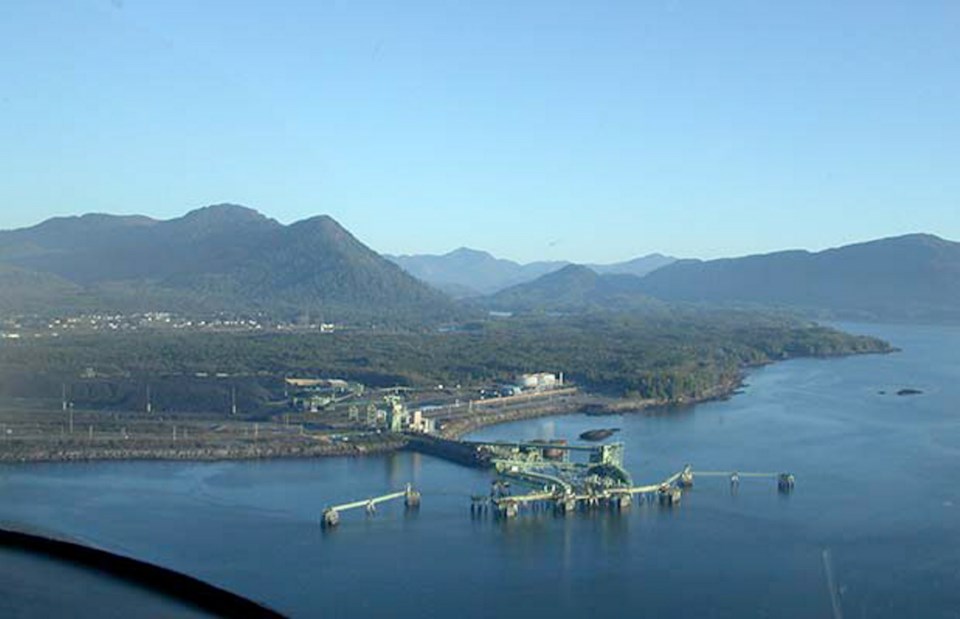Dave Macdonald is mayor of Port Edward, which is 18,000 hectares and scarcely 600 people a few minutes’ drive south of Prince Rupert.
It’s the potential home to the Pacific NorthWest LNG plant and marine terminal that is the subject of the deal that MLAs spent a week arguing over. Government MLAs dwelled on the legal certainties they’re providing to the company, and the billions in new revenue that might flow from the project.
Opposition MLAs dismissed their deal-making, questioned the environmental impacts and doubted the job numbers.
Macdonald just talked about his people.
He’s a well-regarded local leader, but laughed off the gushing introduction he got at a brief event to mark passage of the bill and said he was “a very nervous man.”
The tiny district office has been in the middle of a whirlwind ever since PNW LNG came looking for a site three years ago and Macdonald said “it’s getting busier and busier.”
“What’s very important to me is families staying together,” he said.
The region has been economically depressed for years. The forest industry took a sustained hit, fishery employment slumped and the Liberal government pulled the plug on the heavily subsidized old Skeena Cellulose mills 14 years ago.
Macdonald said: “We lost a lot of families and income, and everything that goes with it. Families had to go all over the country to find work and now we have a chance to bring them home, and for our children to stay home.
“So I’ve never been afraid to say I support the project, as long as its done in the most environmentally friendly way possible.”
It’s hard to imagine the impact LNG would have on Port Ed. The town gets by on a budget of $2.2 million a year. It’s got no recreation centre and few sidewalks, and the mayor is the first to say it needs about $25 million worth of roadwork.
The proponent has committed to $150 million in sustained funding to the district over 25 years, plus millions more on its own infrastructure.
The 600 residents will have 5,000 new neighbours moving in — most of them temps — if the plant proceeds. And there are five other proponents eyeing the region.
Macdonald said: “There’s always a few who dislike it, but the majority came up to me, especially after the election, and said: ‘Keep moving forward, Dave.’ ”
Prince Rupert Mayor Lee Brain was also on hand. He’s 29 years old and remembered that when he was in high school, all the industries collapsed at the same time.
“We lost half our population and ever since then it’s been a struggle for our community to get back on track. Now opportunity is on our doorstep and we’re really seizing the day.”
The city’s financial officer briefed a legislature committee last fall on Prince Rupert’s current plight. She listed $279 million worth of infrastructure work that’s needed in short order. Benefits from billions of dollars worth of nearby LNG construction are being counted on to get it started.
The pair painted a compelling picture of a region that’s been struggling for years and now has a shot at prosperity. Will it be a quick jolt, of the boom-and-bust kind, or a sustained period of growth?
It’s still not a sure thing the projects will proceed. So it’s hard to tell. But it’s hard to begrudge people the chance.
Which is where the NDP seems hung up. A week of debate made it clear they’re dubious about the whole proposition. And their support for the concept in general is barely lukewarm.
They seem to have both sides covered. The Opposition voted for some LNG legislation last fall, then on Tuesday they voted against the bill that allows for the project development agreements. So if the LNG dream takes off, they can point to their support. If it dies, they can cite their opposition.
If you stripped away all the positioning and asked them what they really think, the only sure thing about the answer is that it would be a split vote.
